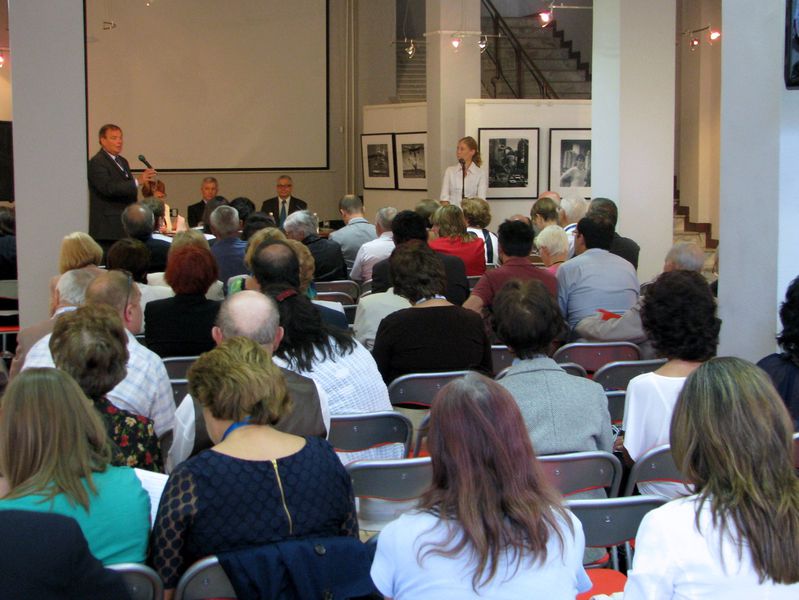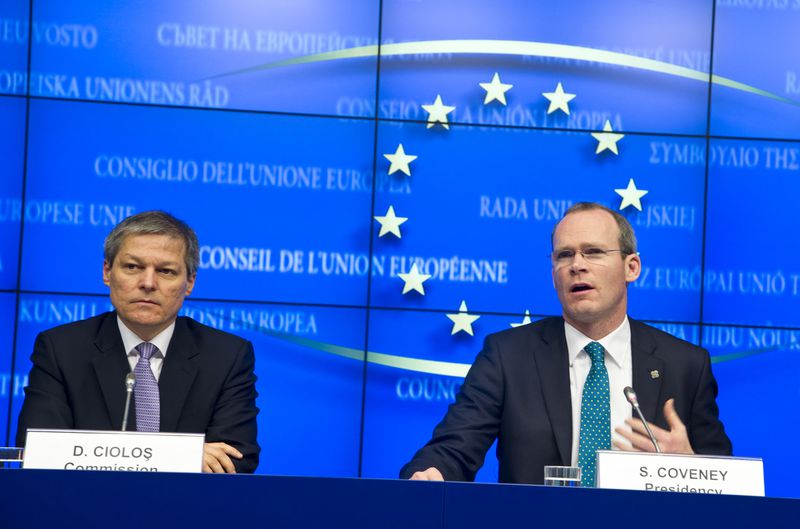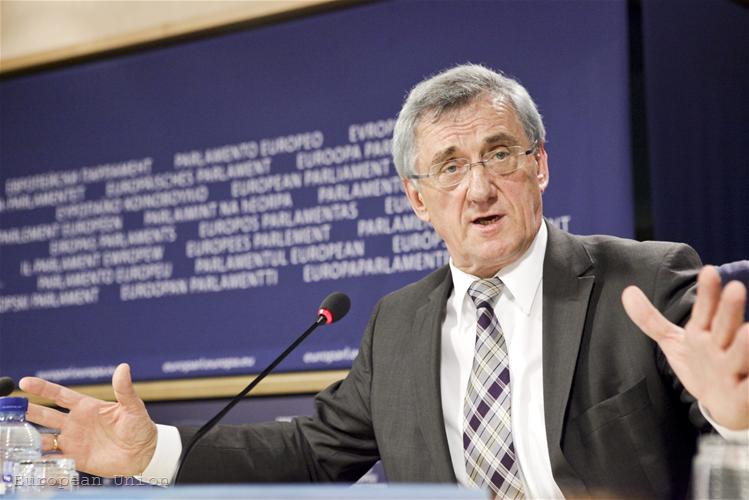Europe Is Looking for a Young Farmer
Adelina Marini, May 3, 2012
 Only 14% of the farmers in the European Union are younger than 40 years of age and only 6% are younger than 35. This striking statistics is the reason why the European Commission has proposed in its draft regulation for reform of the Common Agricultural Policy (CAP) for the next programming period (MFF 2014-2020) a special scheme for support of "young farmers" in the EU. This was one of the points which the agriculture ministers discussed publicly during their meeting on Friday, April 27.
Only 14% of the farmers in the European Union are younger than 40 years of age and only 6% are younger than 35. This striking statistics is the reason why the European Commission has proposed in its draft regulation for reform of the Common Agricultural Policy (CAP) for the next programming period (MFF 2014-2020) a special scheme for support of "young farmers" in the EU. This was one of the points which the agriculture ministers discussed publicly during their meeting on Friday, April 27.
What is a young farmer?
According to the definition provided by the European Commission in its proposal for a regulation, a young farmer is a natural person who is setting up for the first time an agricultural holding as head of the holding, or who has already set up such a holding during the five years preceding the first submission of an application to the basic payment. This natural person should not be over 40 years of age, the proposal reads. The aid for beginners will be restricted on the basis of arable land - no more than 25 hectares. In order to finance this support, it is envisaged the member states to use a percentage of their annual national ceiling, which cannot exceed 2%, for which they will notify the Commission.
It was the definition what a young farmer is that caused the greatest disputes  during the public debate last week. A large number of the representatives of the member states asked the definition "young farmer" to be the same for the first pillar of the CAP (direct payments) and the second (rural development). For instance, Poland requested the young farmers support to be paid entirely from the second pillar and also the farmers to be treated equally, meaning the text that makes payments dependent on the average size of the farm to be removed. Warsaw also wants the support for farmers beginners to be voluntary. A demand that was also defended by Sweden, the Czech Republic, France, Germany, Finland, Britain, Croatia. According to Hungary, however, the support for young farmers is key for the reform of the CAP, which is why it has to be mandatory. Though Budapest will not oppose a voluntary approach. For start-ups the only criterion should be the age limit of 40 years, according to the Hungarian position.
during the public debate last week. A large number of the representatives of the member states asked the definition "young farmer" to be the same for the first pillar of the CAP (direct payments) and the second (rural development). For instance, Poland requested the young farmers support to be paid entirely from the second pillar and also the farmers to be treated equally, meaning the text that makes payments dependent on the average size of the farm to be removed. Warsaw also wants the support for farmers beginners to be voluntary. A demand that was also defended by Sweden, the Czech Republic, France, Germany, Finland, Britain, Croatia. According to Hungary, however, the support for young farmers is key for the reform of the CAP, which is why it has to be mandatory. Though Budapest will not oppose a voluntary approach. For start-ups the only criterion should be the age limit of 40 years, according to the Hungarian position.
Belgium, for its part, said that that support should be available for all farmers below 40 years of age. Slovenia, Spain, Romania, Austria, Ireland asked the support to be mandatory, because this would send a strong message in the entire EU. Romania also thinks that setting a limit of 25 hectares is not realistic and proposed a ceiling of 100 hectares or a radical change of measurement used for comparison of farms. Romania wants the only requirement for young farmers to be their age.
The position expressed by Bulgaria via Tsvetan Dimitrov, deputy minister of agriculture and foods, is in support of the aid for young farmers, but our country focused on another aspect - against the requirement for an agricultural education for the farmers, applying for support under pillar one. But as the country understands some countries' concerns, who want a facultative application, is ready for concessions under certain conditions, which were not mentioned. Bulgaria said nothing regarding the definition "young farmer" or about the proposed limits.
 The reason some countries to demand the support for young farmers to be voluntary, as well as the subsidies for small farms by the way, is that in many of these countries the young farmers are a few, which would make administering of the support quite expensive and inefficient. In response Dacian Ciolos, EU commissioner for agriculture, said that precisely when they are a few support should not be refused. "If you say that you don't have many young farmers and this is why you want the support for them to be voluntary, it is just the opposite - if you don't have enough, if I were a minister, would have been worried. We have to encourage young people to establish farms", the commissioner added.
The reason some countries to demand the support for young farmers to be voluntary, as well as the subsidies for small farms by the way, is that in many of these countries the young farmers are a few, which would make administering of the support quite expensive and inefficient. In response Dacian Ciolos, EU commissioner for agriculture, said that precisely when they are a few support should not be refused. "If you say that you don't have many young farmers and this is why you want the support for them to be voluntary, it is just the opposite - if you don't have enough, if I were a minister, would have been worried. We have to encourage young people to establish farms", the commissioner added.
This is what is written in the Commission's proposal for a regulation, where it is said that the setting up and development of new economic activity in the agricultural sector by young farmers is a great financial challenge, to which direct payments should be focused. The Commission thinks that thus competitiveness of EU's agriculture would be boosted. It is also envisaged this support to be applied for a maximum of five years, taking into account when a farm is established.
In order to avoid a violation of the rights of the beneficiaries, as well as to avoid discrimination, the regulation envisages the Commission to be granted rights to define which legal entity is eligible for payments for young farmers, especially in terms of the age criterion.
Of course, some of the richer developed and mainly northern countries expressed their usual position that the system of direct payments should gradually be phased out and long term conditions should be created for competitive agriculture, which is impossible with coupled aid. For many, predominantly small, countries, however, the direct payments in general and specifically the support for young farmers seems to be a  national priority because of the ageing of farmers, which puts the sector at risk in the middle and longer term.
national priority because of the ageing of farmers, which puts the sector at risk in the middle and longer term.
The demographic problem in agriculture was outlined as a major one during the first conference which Commissioner Ciolos organised on the future of the CAP in July 2010. Then data were shown, according to which in 10 years (now 8) 4.5 million farmers are expected to retire of an overall of 13 million registered farmers. The biggest challenge for beginners, however, proved to be access to funding. In a moment of tough budgets and looming of a banking crisis in Europe, the only support beginners can rely on is precisely subsidies.
The support for young farmers is a tiny part of the reform of the CAP. During the debate on Friday the ministers discussed also support for small farms, the natural constraints zones, the definition "active farmer", capping support for big farms and internal redistribution (on national level). The negotiations on the reform of the CAP will continue in the next weeks in the context of the negotiations on the next budgetary framework 2014-2020. In May the Agriculture Council will focus on the envisaged greening measures and in June there will be debates on the policy for rural development.
 | © Polish Embassy in Sofia
| © Polish Embassy in Sofia | © Council of the EU
| © Council of the EU | © European Union
| © European Union